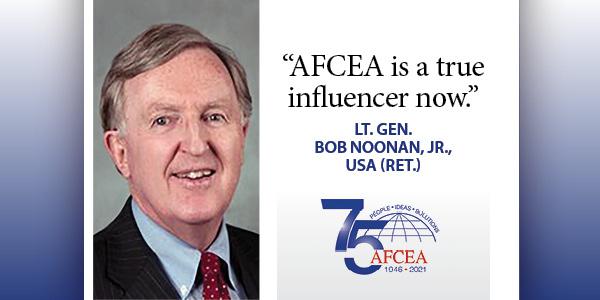Classified Events Differentiate AFCEA’s Intelligence Committee
Both classified and unclassified symposiums build the bridge between industry and the intelligence community.
Both classified and unclassified symposiums build the bridge between industry and the intelligence community.
AFCEA’s Intelligence Committee is a group of intelligence community (IC) vets and leaders from military and industry, including small businesses and start-ups, with the goal of helping the IC build a better bridge between industry and government.
“We want candidates who work hard and want to build that bridge, but we also want to make sure they have the contacts to do that,” says Lt. Gen. Bob Noonan Jr., USA (Ret.), the chair of the Intelligence Committee.
Along with his deputy chair, Lewis Shepherd, Gen. Noonan also wants his committee members to provide thought leadership and innovation within AFCEA. They have had some liaisons with the Homeland Security and Cyber Committees, and he thinks there’s more potential for working together.
“AFCEA is a true influencer now,” says Gen. Noonan. He thinks the association is “much more of a player than it was” when he had his first experience in 1990 while serving in the Army.
He retired in 2003 and took a job at Booz Allen Hamilton. It was there that a colleague recommended Gen. Noonan join the Intelligence Committee.
What differentiates AFCEA’s Intelligence Committee from other committees at military and government associations is its classified events. “We do those every year, in an industry day format. It’s a chance for the service intelligence leaders to stand up in a classified environment and say, ‘These are our requirements right now, these are our architectures, this is our vision for the future,’ and share with industry and in some cases academia, what they’re trying to do,” says Gen. Noonan.
Every September, AFCEA teams up with the Intelligence & National Security Alliance (INSA) for the Intelligence and National Security Summit. “There we bring in all the different agency heads; we have the director of national intelligence give a keynote and numerous breakout groups will cover everything from the workforce in a COVID environment to diversity in the IC,” Gen. Noonan explains. “We’ve had sessions on different technologies, like AI and how that’s applied to the intelligence program,” he adds.
The two-day summit also features a classified day, which the Intelligence Committee usually ends up heading since it has so much experience with classified events, says Gen. Noonan. Though there was no classified day last year since the summit was virtual, the event still brought in hundreds of attendees.
The committee also hosts a Spring Symposium every year. “We bring in speakers to address the intel community at large, so we talk about new things such as technology. We talk about threats. We’ll get experts that can talk about the China threat, the Russia threat and we bring in people from not only agencies, but we’ll bring in authors, people from think tanks,” the general explains. “We’re trying to create an environment of a good exchange of ideas, not necessarily groupthink. We’ll have the acquisition people come in and talk about changes there,” he adds.
The committee meets at least monthly and usually features a speaker. The subjects vary but the quality of the speakers is always top notch, says Noonan. “One of the areas we are looking at now, a brand new one that’s going to be with us for a while, is this whole issue of space. What are the requirements? We’ve got this Space Force that’s been stood up, they’re moving some headquarters around. What is that going to look like in the future?” Gen. Noonan asks.
A big part of it is learning what the intelligent requirements are for the Space Force to execute their operations, he explains. “And I’ve got to tell you those are still being defined. I’m not giving away a national secret. There’s a lot of research and development that has to go into it and science and technology. How do you protect the stuff that’s coming down from space? There’s a whole cybersecurity thing that fits into that. How do you secure all that? Space is a very hot topic,” says the general.
Since the committee hasn’t been able to meet in person due to the pandemic, they’ve held their monthly meeting virtually. “We still have the speakers, and then we have a Q&A; then we just run the business of a committee, which focuses a lot on the upcoming events,” Gen. Noonan explains.
In addition to that, the committee has been running webinars. “We’ve had a lot of interest and lots of really good discussion. Most of it is focused on how to deal with the big amounts of data, which is a problem for the whole country, medicine, the economy, finance,” says Gen. Noonan. “You’ve got all that data, how can you use the tools to produce better intelligence?”
“We talk about how to teach people to think critically, how to teach people to write so that the decision makers can make sense of what you’re saying. It’s a broad brush towards the whole discipline of intelligence. Again we can’t talk about the secret stuff, we look forward to doing that in person and hosting classified days soon,” he says.
On a personal level, Gen. Noonan is focusing on greater diversity inside the committee, including diversity of gender and race but also a “diversity of ideas,” he says. “There’s a tendency for a lot of the committees to pick their old buddies from their old organizations. We’re looking for people that are noted for rattling the cage a little bit, in a mature way and being disruptive in a professional way,” Gen. Noonan emphasizes.
Some of the committee’s newest members include Lisa Porter, the former deputy under secretary of Defense for Research and Engineering and founding director of the Intelligence Advanced Research Projects Activity, as well as Lt. Gen. Vincent R. Stewart, USMC (Ret.), former director of the Defense Intelligence Agency who was the first African-American, first Jamaican-American and first Marine to hold the position. When these type of people call, people pick up the phone, says the general. “And it helps enhance our reputation.”
Mostly though, Gen. Noonan is looking for people who are willing to work at it. “We need help putting these industry days together. Our [volunteer] members organize events, they run the panels, they moderate, they get people scheduled and create the topics. I need people who are willing to work,” he states.
AFCEA is celebrating its 75th anniversary in the September issue of SIGNAL Magazine. Join AFCEA now to ensure you receive this commemorative issue.



Comments